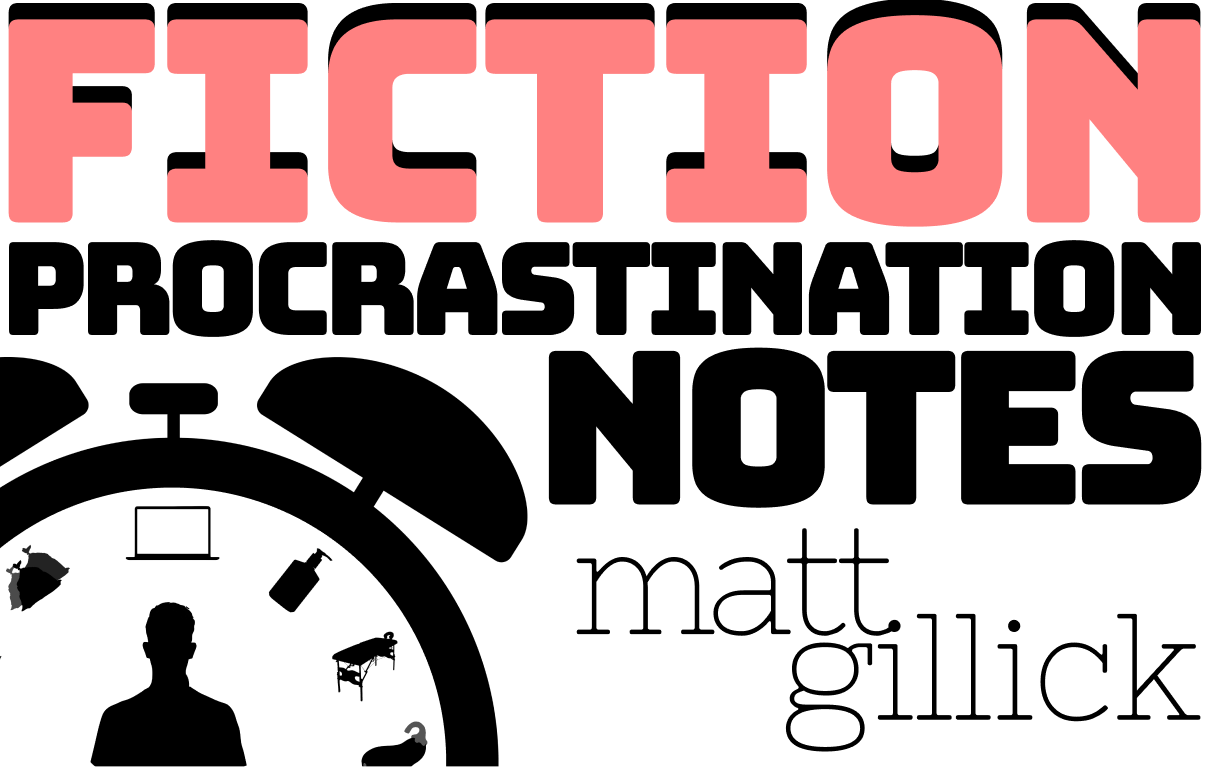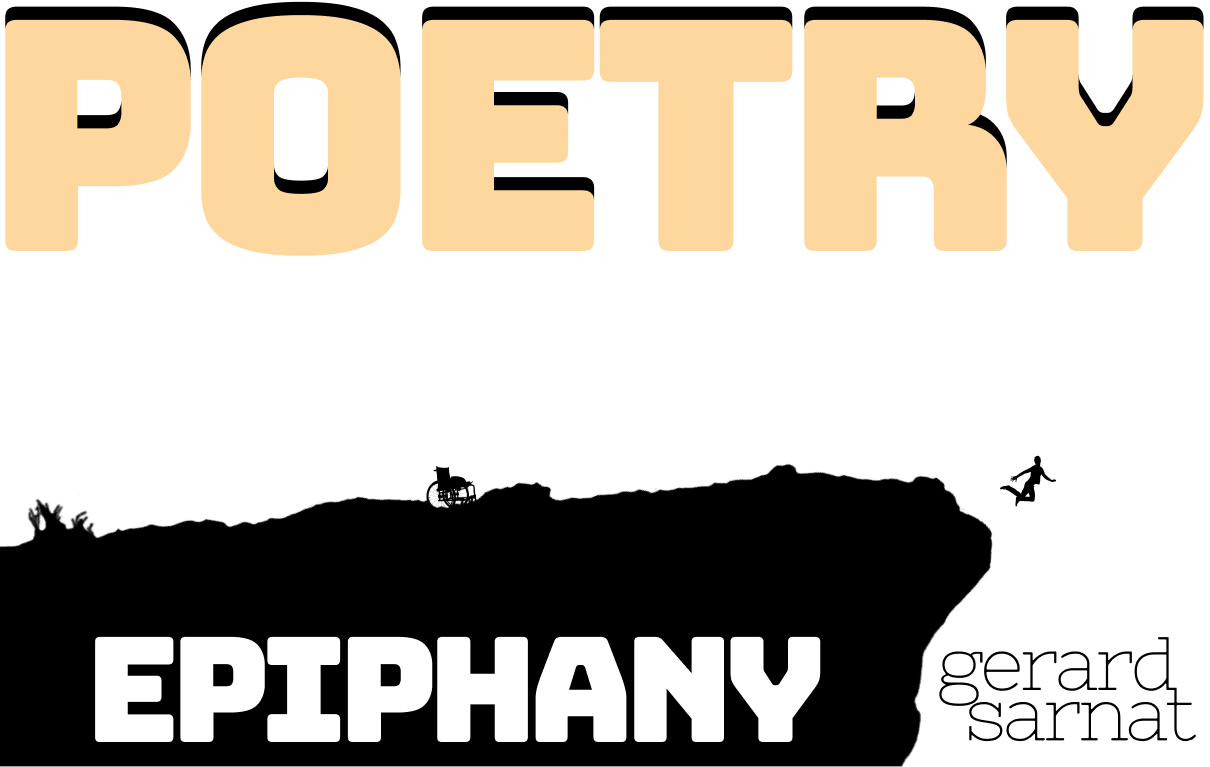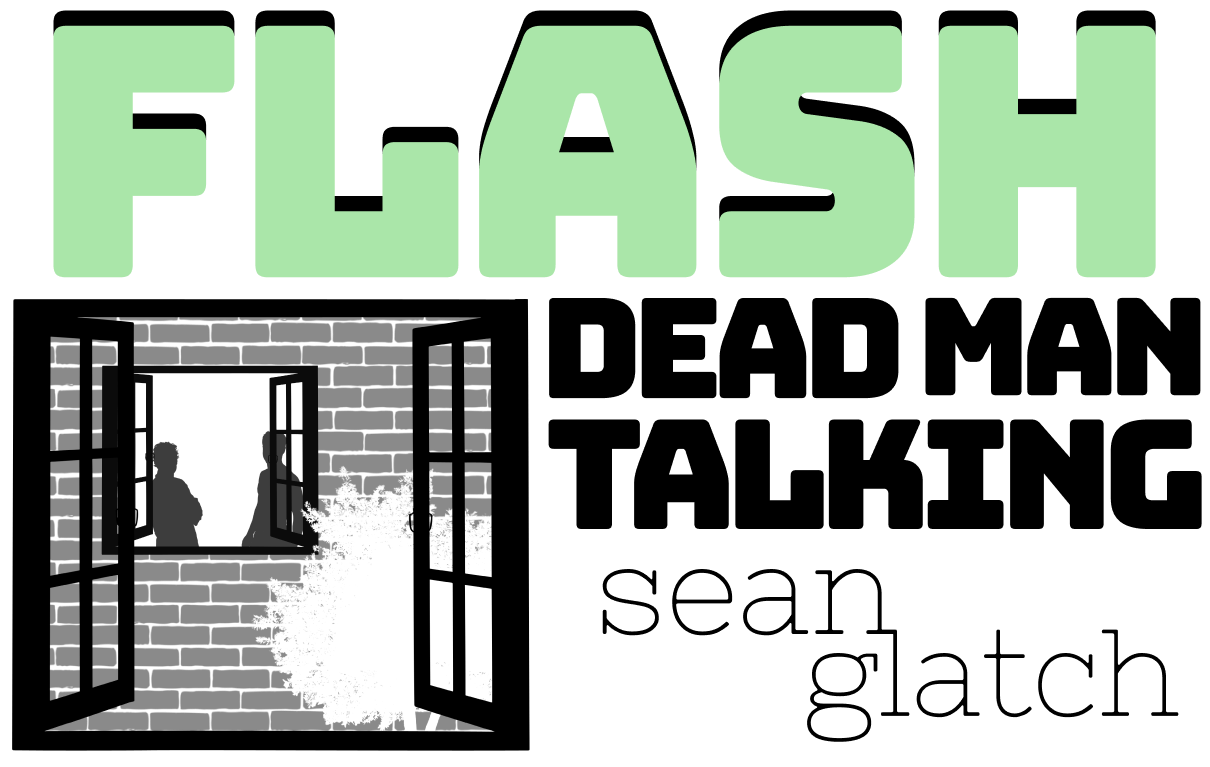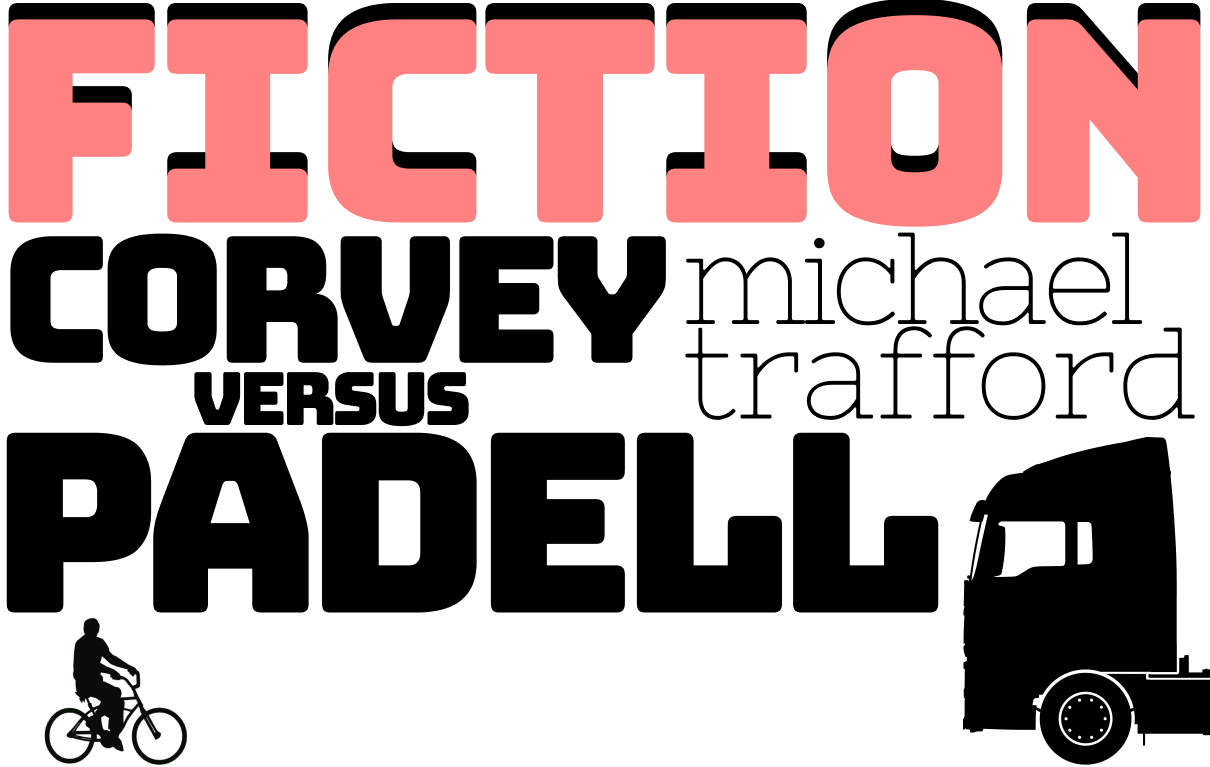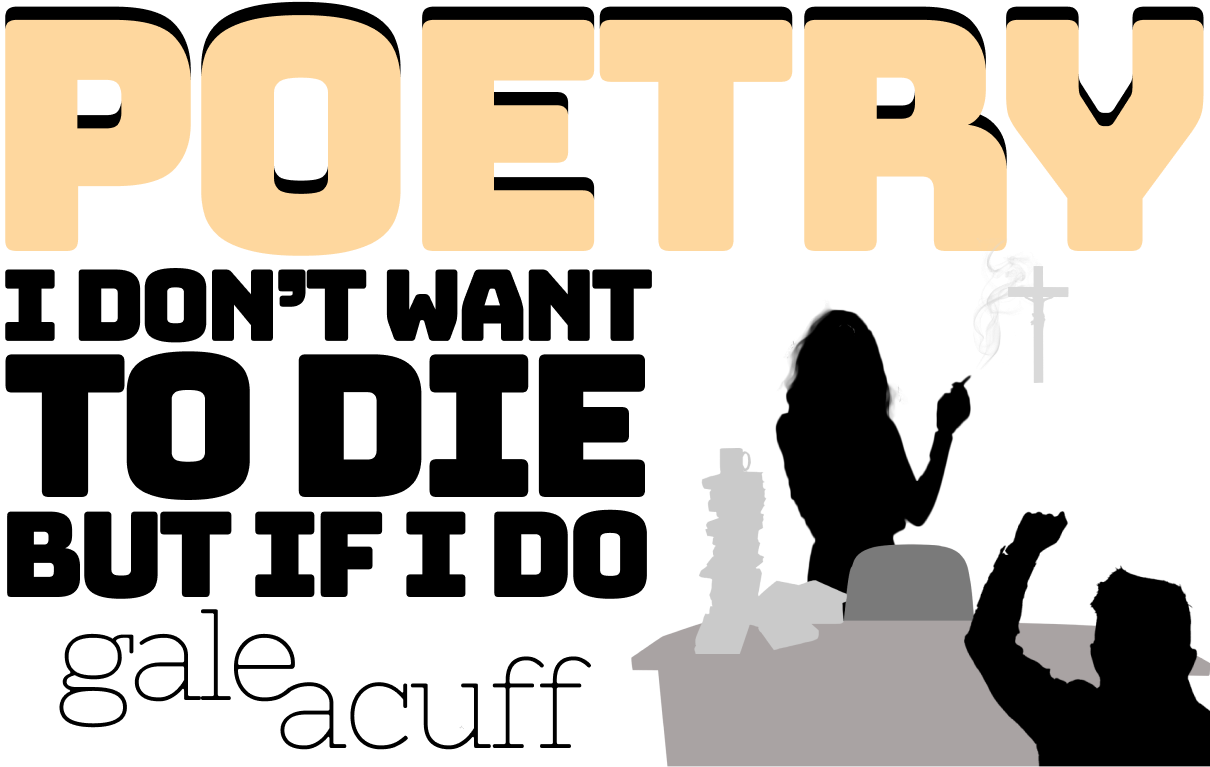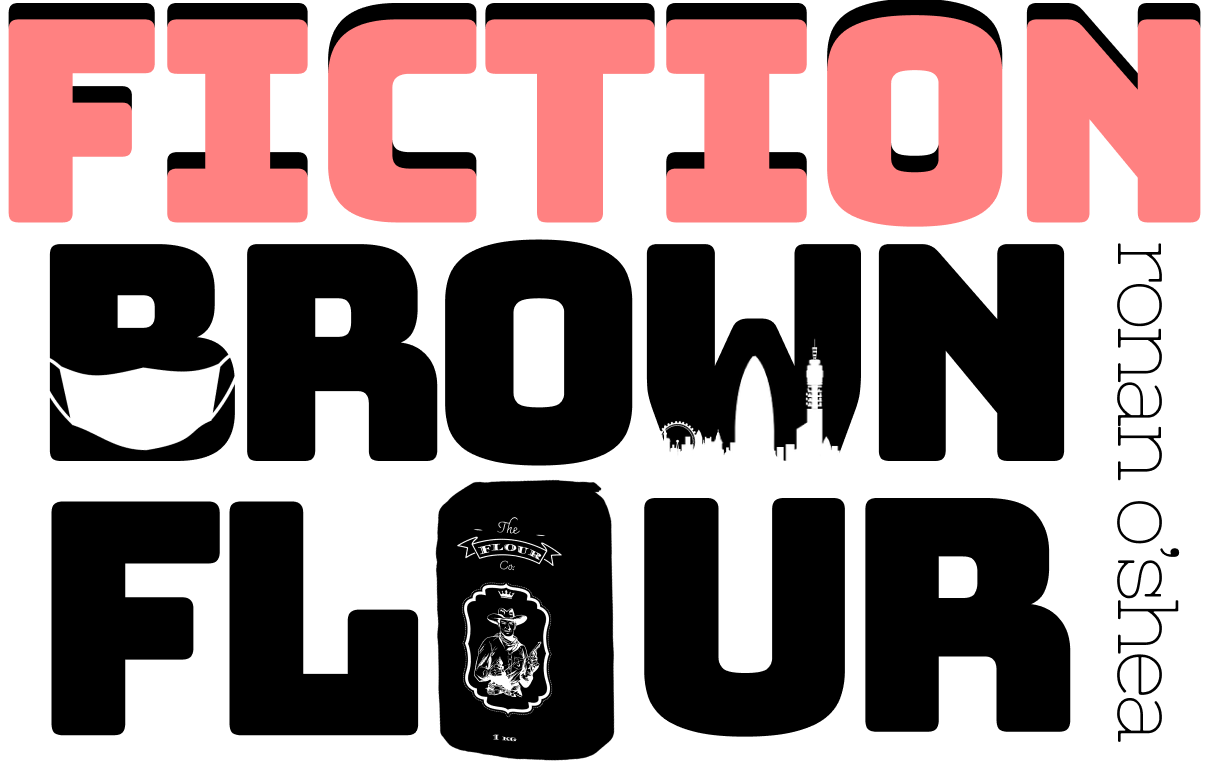
Brown Flour
I was talking to Mehmet. The chat was dragging out, for two reasons. One, he was lying. Two, the impatient queue behind me was too terrified to interrupt us. In keeping with the times, each person was keeping a self-preserving distance from the next.
“Seán, I am not lying to you,” said the shopkeeper’s son, who worked for his father.
“Mehmet.”
“Seán. We have no flour.”
They had flour. I knew it. Mehmet’s father was a businessman. He had a back room: whiskey from Japan, bought on the cheap from his mate in the merchant navy; fags from the homeland. You name it, Mr. Yilmaz had it in.
Mehmet smiled.
“Seán, my father buys flour legally.”
“So?”
“So, there’s nothing you can do about supply when the source is legit. Anyway, the problem’s with the bags.”
“What now?”
“Flour producers make flour for bakeries and factories. The rest is surplus.”
“Which means?”
“Which means plenty of flour but not enough small bags for shops like this. Understand?”
I shook my head. “Not really.”
He nodded his head. “Well, that’s not my problem. Now can I please serve my other customers?”
Grumbling, I began to leave.
“Seán?”
“Yes?”
“That’s £9.43.”
I paid for my goods – sans flour – and left.
I had to get home quickly to avoid the righteous din, the pandemic’s equivalent of a forty-one-gun salute.
Sadly, in grumbling to Mehmet about flour, I was too late. The sound rang shrilly in my ears. Mr. Ragazzi at 43 was clapping politely. The mum at 64 was out front with her littluns, whose sweet, tuneless clapping was ingloriously out of sync. And then there was the man at 71, stood a four-foot distance from his porch with his legs splayed outwards like a Tory minister in power stance, rattling his stainless-steel ladle against a stainless-steel pan.
The din continued until I got home. I went inside and washed my hands. Happy Birthday. God Save the Queen. Tra la la la la.
The sink basin was like a beautiful swan, the hot water steaming. I thought of old Mr. Ragazzi, the mum with her littluns, the gobshite at Number 71. One thought stood out. Mehmet Yilmaz was naïve if he thought his father wasn’t selling brown flour on the sly.
Like toilet paper, flour had swiftly become gold dust, and Mr. Yilmaz was nothing if not a shrewd businessman. Moving to England in the late 80s, he was the perfect combination of hard-working migrant and Thatcherite golden boy; a regulator’s scourge; the taxman’s blight.
He had flour. And I wanted it.
“For fuck’s sake, Seán.”
“I’m sorry,” I said. “I said I was sorry.”
Cat was angry. Rightly so.
“It’s not my fault you had a bad day.”
“I know.”
“It’s not my fault you can’t just talk to women like a normal man and tell them that you like them.”
“I know.”
“It’s not my fault you hate your life.”
“I don’t hate my life.”
“You do.”
“Okay.”
She was in the kitchen buttering toast. She spread it with Marmite. Usually, she cut the edges off because she liked to pretend she was eating kites. Now, however, she was taking her frustration with me out on the bread, layering the Marmite on in thick, angry bursts.
“Outside,” said Cat, once she was done. It was an order.
We walked out into the small garden of our flat, a broom-shaped area of concrete with a Yankee candle in a metal frame at the far end. After getting home, I had made the mistake of airing my own frustrations in a sweary, childlike manner.
“Sorry, Cat,” I said. “I think the stress is getting to me.”
“No, you just want to make bread for that Mexican girl.”
“I do work in a care home.”
Cat snorted in derision. “With mentals. Not oldies.”
I allowed my jaw to drop. She had a way with words.
“What?” said Cat. “It’s true.”
“It’s the Tube journeys that worry me,” I said.
“Last week you took a picture of mice on the platform. You didn’t seem so scared then.”
“Coping mechanism.”
Cat handed me a roll-up, lit up and exhaled from her own. “You’re having a tantrum, Seán.”
She was right. I apologised. She softened. “I’m sure work is stressful. But don’t be a cock.”
“Sorry.”
She smiled. She had won. Cat pulled a curl of russet hair from her blouse and dropped it onto the concrete.
“You only met this girl three times. She could be a terrible human being for all you know. A cheat. A Tory.”
“Do Mexicans come in Tory?”
“Yes,” said Cat. “They do. Very much so.”
“Well, she doesn’t seem like one. And besides, you shouldn’t be so tribal.”
Cat let out a laugh.
“Says the man who films himself giving the Emirates the finger while jogging.”
“I do that for bants,” I said.
“Don’t use that word,” she replied.
I told her there were worse things than hating Arsenal. She rolled her eyes.
I had known Cat since university, halls, first year, she the cool English student with the boyfriend back home, me the virginal sociology undergrad. We had been best friends more or less since. She had seen me through depressions and a break-up, while I had seen her through a depression and several break-ups; most notably Paul, the banker no one liked but who, importantly, she did, such that she was lost and a little heartbroken when he moved to New York to head up the bank’s equities and graphs division in 2018.
Now, the pair of us were in a small garden on the fringes of inner North London, smoking our roll-ups, confined to the home we shared with Hugh, a graphic designer who very rarely left his room.
“It just seemed like a goer,” I said. “And then this happened.”
“The bedridden masses feel for you,” said Cat.
I turned to face her. “You don’t always have to give me a sense of perspective, you know. I’m simply venting my bad-”
Seeing her lift her eyebrows, I paused, then spoke again.
“Relative bad luck.”
Lowering those brows, she conceded. Then she laughed, blowing out a plume of smoke.
“Three dates you had?”
“Yes,” I said.
“She doesn’t sound like much of a goer.”
I shook my head. “Don’t be so crude.”
She smiled. “Don’t be such a prude.”
I sat in silence, forcing her to pry.
“You kissed on this last date, right?”
“A little.”
“A little what? Tongue?”
I scrunched my nose. I found the inquiry prurient and distasteful. Cat was right, I was a prude. Cat was always right. She put out her cigarette, the roll-up going L-shaped as she dug it into the Madeira ashtray on the green metal table in the garden. She looked at me sympathetically.
“Seán, babe. It’s going to fizzle.”
“I’m going to make her a loaf of soda bread.”
“A natural response to my comment,” she said. Cat took a breath before speaking again. “Remind me, why is it you decided baking bread would win over this girl’s heart?”
“She said she liked baking. I’m going to make her a loaf of soda bread and leave it outside her door.”
“She lives on your route home?”
“More or less.”
“Emphasis on less?”
“A road out of the way. Road and a half, tops.”
Cat thought on it, said nothing a long while, then nodded.
“Seán?”
“Yes?”
“It’ll fizzle.”
I was not a fan of the modern trend for algorithm-based dating. In recent years, I’d received many the sugar-coating response following a seemingly enjoyable evening out: texts that stated it had been great fun, but for the lack of chemistry; others which alluded to ex-boyfriends who had miraculously gotten back in touch. And of course, there were the messages that I sent that did not receive a follow-up at all. I say this not to elicit pity (as Cat might have it), for when the shoe was on the other foot, I was no better, either rustling up a white lie or, better yet, opting for no reply at all.
It was a cold existence.
With Maria, however, I honestly thought my lengthy search for a partner might be over, only for the Tory government to have other ideas. The edict was published, the amatory shutters – as it were – closed, and my hopes for romance dashed for the foreseeable future.
Since the start of the Lockdown, however, we’d remained in touch, needing the hope of it, I suppose. She had begun by sending me pictures of her home baking; I’d replied with more of the same: a banana bread here, a soda loaf there, the grainy photos more wholesome than arousing. Naked selfies it was not.
Maria admired my baking, but more than anything she said she admired my courage, bravery and vocational zeal. I worked in a care home for people with mental illnesses, schizophrenia primarily, some with dual diagnoses of drug addiction, others not, all of them suffering in their unique way, most unable to adhere to the notion of Lockdown as they were, already, locked within themselves.
In brave, brave fashion, I had continued to work as the Lockdown ensued. I abided by the rules. I went to work, I came home. I shopped only for groceries and bought only what I needed, from Mr. Yilmaz’s store. Maria was very impressed, and I was more than happy to feed her notions of keyworking valour.
As for Mr. Yilmaz, he had become a fixture of my working day: opening his shutters as I left home for the early shift, still glued to his counter when I walked by at night. Me, him, the Deliveroo boys and horny, hungry foxes were the only beings out and about beneath the night sky.
So it was with some surprise that I looked out of my window later that evening to discover Mr. Yilmaz walking down the road, rather than festooned by his vodkas, scratch cards and chewing gums.
He was a workaholic, according to Mehmet. His diabetic wife was confined to home, with Mr Yilmaz looking after her in the few hours when the shop was shut. And so I was curious as to why he would be walking in the direction opposite both his shop and his home.
I watched, my eyes following the man as he walked on by, a backpack slung over one shoulder, pockets kissing his hands.
Me and Mehmet Jnr. had become friends over the previous year, due to a shared interest in Gold Leaf tobacco and Red Dead Redemption 2. I was talking to him now on WhatsApp video.
“I’ve no idea, man,” he said. “I think he’s losing it. He’s shouting a lot. Smoking more than usual.”
“That doesn’t sound unusual.”
“He told me he loved me the other day.”
“That does.”
The video lagged a second, then normal service resumed.
“It’s true he’s been out and about more,” said Mehmet. “I thought he was picking up supplies.”
“Of?”
“Not flour, Seán.”
I said nothing, allowed the hum of my Macbook to fill the air as I looked at Mehmet’s face on the screen of my phone. I had my laptop open in front of me, the phone propped against it, Mehmet’s face staring sometimes back and sometimes away as he played the same video game as myself.
“That’s the problem with white people,” said Mehmet.
“Excuse me?”
“You watch one series of Bake Off and you all want to copy it.”
“I’m not sure it’s a race specific trait.”
Mehmet laughed. “It is.”
I was riding Shergar, my steed, through a videogame woodland. I killed a deer that crossed my path, plying it with arrows before dismounting the horse to retrieve its pelt. The joy of wanton murder coursed through me.
It was not the claps of the unthinking public that sustained me during the pandemic, but rather that ineffable wonder of a pixelated, turn-of-the-century America, where you could mug an innocent citizen one minute before hunting down an endangered (even then) species of bird the next. Beautiful.
“What do you think your father’s up to?” I asked.
“Same as usual,” said Mehmet. “Burying himself in that shop.” He looked at the screen again. “I need to go. My mother’s calling me.”
“Later.”
The call ended. I looked at the screen, the water of a lake gleaming in front of me. Looking out of the window, I saw the same man I often did exercising on a terrace far away. My room was small, a little cramped. It still smelled like the jerk chicken from my takeaway the night before. Putting a knot in the rubbish bin, I went downstairs to empty it before heading for the front door.
Cat came out of her room and walked into the hallway.
“Where are you going?” she asked.
“State mandated walk.”
She eyed me suspiciously. In the background I could hear the sound of journalists – Cat’s colleagues – laughing, talking about baked goods and weekday booze, young children and HIIT. Cat peered through her door, then back to me, with a pained expression on her face.
“Wearying?” I asked.
“A mite.”
“You went for your walk earlier today, didn’t you?”
“Yes,” she said. “Well, it was a stroll, technically.”
There was a pause.
“Everyone’s distracted by TV reruns and online quizzes. I won’t tell a soul if you want to join me.”
“Yes please.”
“Just don’t judge me.”
“Case specific or generally?”
“Case specific. I can’t expect the absence of judgement generally. I do too many silly things.”
I waited for her disagreement. It did not come.
“I saw Mehmet’s dad walking towards the stadium.”
“Really? He hardly ever leaves that shop.”
“Exactly. And I want to know why.”
“Because he’s not selling you flour.”
“Because that. And because I like mystery. You in?”
Cat peered back towards her room. Someone was telling an anecdote about their children’s living room performance of Romeo and Juliet and asked if the others wished to see the video.
“Fuck yes,” she said.
The lights of the Chinese takeaway were off, a sign of the desperate nature of the times. People were walking the streets with masks on their faces, zigzagging from one another. We did likewise, until Cat noticed something unusual on the pavement: a long white trail, a line so thick you’d need a didgeridoo to hoover it. Kneeling down, I dabbed it with my finger.
“Seán, don’t,” said Cat.
I did.
“That’s really not in keeping with the age we’re living in,” she said. “What is it?”
I turned to look at her. “Flour.”
We walked on.
Only the streetlamps outside were on now. It was a Thursday night. The Arsenal ought to have been losing, but it was deathly quiet, such that it was easy to spot the two men walking towards one another in the near distance.
The first man took off a backpack and handed something over to the other. He crouched on the floor, swore loudly in Turkish, looked about himself and realised he’d wasted half a kilo or more of his supply.
“Is he selling flour on the sly?”
Cat nodded. “Looks like it. I suppose it’d be a bit risky if he were doing it at his own shop.”
“Why?”
“The tabloids are hog-mad about shaming shopkeepers these days. It’s a free hit at brown people without the need for limp subtext.”
“The scum of the earth.”
“Sorry?”
“The red tops.”
“Ah, yes. The scum of the earth.”
We watched the scene evolve in front of us: Mr. Yilmaz handing over the flour, the other man money, the pair departing from one another. Did Mehmet know?
“Quick,” I said. “Let’s go.”
“Where?” said Cat.
I pointed towards the man Mr. Yilmaz had met, who was now walking towards Drayton Park.
“Seán, we can’t follow people.”
“I have to know.”
“Know what?”
I turned to her. “Why?”
But as quickly as I’d said it, the figure had gone, disappearing into the darkness like a moth to the night. Perhaps, I wondered, Mehmet might have some answers.
He was on my phone screen, his face a stolid rictus of pained concentration.
“Bastard,” he said, suggesting some 2D foe had gotten away from him.
“You still on the Tomahawk challenge?”
He nodded, a slight delay in the call rendering him in aspect a moment or so.
“They keep flying away.”
“Eagles will do that. You need to approach them slowly, then let loose with unrelenting fury. If you miss the one in Owanjila, head to Bard’s Crossing. If you miss the one there, head to Owanjila. If you miss the ones in both, have a mosey in Cattail Pond North or the same water body, East. And if all that fails, go Guinness.”
“Huh?”
“Good things come to those who wait, Mehmet.”
Several moments passed. I didn’t know whether to tell Mehmet I’d seen his father selling flour up by the Emirates stadium. Ultimately, I decided I had to.
“I have to tell you something.”
He paused the game. “Yes?”
“Me and Cat were taking a walk. We saw your dad outside the Arsenal ground.”
Mehmet listened as I detailed the scene.
“The prick,” he said. “And with my Mum shielding and everything.”
“Sorry Mehmet,” I said.
There was a muffled noise his end. He told me he’d to go help his Mum with something at home.
Cat was in the kitchen when I went downstairs. She was chopping onions and carrots for spaghetti Bolognese.
“Wine?” she said.
“Please.”
I sat down. “That Mr. Yilmaz is one sneaky fuck.”
Cat shrugged. “Disaster capitalism. It’s not exactly asset stripping.”
“It’s the principle of the matter,” I said. “He ought to be ashamed of himself.”
Cat laughed. “Okay, Mother Teresa. For all we know, he needs the money.”
I sipped my wine, looked up at Cat as her knife cut through an onion. I opened my mouth to speak, only to be interrupted by the din of self-congratulatory cheering. I looked at my phone. It was eight on the dot. And the band played: a man with a pot, another a pan, some dickhead whacking a bin lid on the ground like it was 1970s Belfast.
“Seán?” said Cat, distracting me from my thoughts.
“Yes?”
“We’re out of carrots. I would like to add one more to the meal.”
I nodded. “Anything else we need?”
“Sponges. Could do with stocking up for the weeks ahead. Kitchen roll if they have any. We have to be uber careful with cleaning, don’t we?”
“We do,” I said. “You’re trying to get away from another House Party call with your colleagues, aren’t you?”
She nodded.
“They’re insufferable.”
“Kitchen roll it is.”
We got our coats and left for the shops as the din began to fade.
Mr. Yilmaz didn’t blink.
“Like I said. We’re out of flour.”
I nodded. “Even for… five pounds?”
He shook his head. “No.”
I nodded. Plonked the wine on the counter along with the sponges, carrots, kitchen roll and a Milka bar.
“You’re friends with my son, aren’t you?” said Mr. Yilmaz.
“Yes,” I said. “We bonded over Red Dead Redemption and Rik & Morty.”
A voice in my left ear took the attention of both of us. “Mate, hurry up.”
I turned. A group of customers were lining up, from the chocolates all the way back to the tinned lentils and harissa pastes.
“Shut the fuck up,” I said, surprising myself. I turned back to Mr. Yilmaz. “I saw you up at the Emirates. Why?”
His eyes flickered a moment, before he settled his nerve and leaned in.
“That’ll be £15.49.”
I paid for my goods and left.
Maria hadn’t replied to my last message in over three days.
“I think the Mexican girl ghosted me.”
Cat nodded. She walked to the countertop and took a glass down. She poured an Irish measure of gin and opened the fridge, taking out a bottle of tonic water, which she proceeded to open, slowly.
“You know what that is, Seán?”
“Tonic water.”
The bottle gasped.
“Fizzling, Seán. It’s the sound of fizzling.”
“You nuts, fam?”
“I am not.”
“My dad’s not a man to mess with. I once saw him throw a tyre at a pregnant woman.”
“That sounds… troubling.”
“She was coming at us with a knife.”
“Did you know this woman?”
“His cousin’s wife,” said Mehmet, pressing the B and X buttons with hapless fury, having his outlaw negotiate a moving train and the strong arm of the law.
“I see.”
He sat back, frustrated, the sound of his character dying playing tinnily between his smartphone speaker and my laptop.
“He’s been up there every night this week.”
“Where?”
“The Emirates.”
“How do you know?”
Mehmet paused. He had a look of uncertainty to him, a look of fear even.
“I was jogging.”
In a room elsewhere, I heard the inimitable laughter of Pedro, our neighbour. It was a hyena-like thing that forever brought me joy. He was watching one of his Argentine comedies, as per, his pant-piss laughter echoing through the quiet of the house. It had become pronounced the last week or so, as Cat eschewed completely the nightly screen calls with family, friends and colleagues, while I had ceased to watch the evening news if I wasn’t working.
“Mehmet,” I said. “I can’t bring myself to believe you were jogging. What were you doing?”
He paused, looking sheepish.
“I was drawing.”
“Drawing?”
“Yeah,” he said. “I like to draw. So what?”
Blanching, I sat back, put my hands up in the air. “Nothing. I just didn’t know you drew. What do you draw?”
Mehmet walked away a moment. I stared at his room while he was gone: Besiktas and Arsenal scarves flanking a poster of Tupac Shakur.
He returned, flipped over a landscape A4 pad, and showed me his work. It was what can only be described as The Emirates football stadium as Medusa, a large behemoth of a building with tentacles spewing here and there. And yet, despite the oddity of it, what I said was no lie.
“It’s… good, Mehmet.”
Ashamed, he looked down.
“I mean it,” I said. “You’ve a certain kind of style. Why didn’t you tell me you drew?”
He looked at me onscreen. “I’m the guy who links your housemate weed and sells you beer.”
I paused, opened my mouth to speak, thought better of denying the gaping chasm between us.
“Well, Mehmet. You’re good. Keep at it I’d say. Speaking of the Emirates, I’ve not had my allotted walk today. Could do with some company. You free?”
I didn’t have a father of my own to be disappointed in. A stepfather yes, but he had neither disappointed nor pleasantly surprised me. He had just been, and he had been good enough, I had to concede. So, it was with an alienation of sorts that I observed Mehmet watching his father deal contraband flour to members of the public. Expecting to see a tear in his eye or a set-edge set of teeth as I turned to face him, what I found instead was Mehmet sketching his dad. We all have our coping mechanisms.
“He’s putting my mum at risk,” he said. “He should be at home.”
Watching as the shopkeeper looked about himself warily, I experienced a moment of clarity.
“He’s not the only one,” I said.
Mehmet was about to speak, but a figure in a long black coat and fedora approached his father. What the pair exchanged we could not see. Nods were swapped, though I didn’t see any money, and was surprised when Mr. Yilmaz began to walk towards Holloway rather than back to his shop. We followed him.
The Holloway Road was ghostly quiet save for passing ambulances and cars. The homeless had been temporarily homed, the homed confined and grumbling. The Costas were shut, the Argos too, likewise the Morrison’s in the middle, the fancy Italian restaurant further down, the Irish pubs on the northern end, near Archway.
We kept a safe distance from Mr. Yilmaz, wary of getting caught.
The older man, who was anywhere between forty-five and sixty as far as I could tell, plodded along the road with his bag slung over his shoulder. He had a teenage air to him, a sort of languor in his steps.
Eventually, he stopped, waiting a moment until another man sidled up to him. They shook hands. Mehmet looked surprised.
“That’s Mr. Wong.”
“Who?”
“Runs the Chinese at the end of Hollis Way.”
“It’s a good Chinese,” I said.
Mehmet nodded. “What’s he doing talking to my dad?”
The pair turned our way, and we crouched behind an Islington Council bin, watching on as they crossed the street and into the Lorraine Estate, after which we followed, keeping a safe distance lest we be caught.
In crouched walks we made our way up the stairwells, behind both men, looking around red-brick walls as they stopped at flats.
Mr. Yilmaz knocked on a door. “Delivery,” he said.
We saw only a woman’s arm reach out from the doorway, its owner uttering a croaking, desperate thank you, as Mr. Yilmaz handed over a Bag for Life filled with unseen contents.
Again, no money changed hands.
“My-” I began.
“God,” Mehmet finished.
We looked at each other. The two men were giving it away.
Mehmet thought it unlikely his father had developed an online delivery system.
“It takes him five minutes to send a text on that Nokia 3310.”
The pair of us watched as Mr. Wong and Mehmet’s father went door to door, handing in packages, saying words like flour and milk and tampons to the unseen but presumably grateful faces inside.
Wondering how I’d got it so wrong, I was pulled from my reverie by the sound of a pencil falling sonorously on the concrete stairwell floor.
“Mehmet!”
“Dad.”
“What are you doing here?”
Mehmet paused and, with a sharp intake of breath, decided for the first time in his life to push back on his dad. “What are you doing here?”
“Delivering food parcels. What’s he doing here?” he said, pointing at me.
“Seán.”
“Who?”
“My name is Seán,” I said.
The man laughed. Mr. Wong did too. “That’s a funny name,” he said.
“I know you,” said Mr. Yilmaz. “You’re the annoying prick who was looking for flour.”
“I wasn’t the only one,” I said.
“You live with that pretty girl,” he said.
“Cat,” I replied.
He nodded. “You want flour? Go talk to that girl.”
“Who?”
He smiled. “You blind fool. Go home.”
He turned to his son. “And you. Go home before I kill you twice.”
I looked at them. Six bags of flour, brown and white, sitting on the counter. She had been keeping them in her cupboard. Now, after I’d confronted her with what Mr. Yilmaz had said, Cat had disclosed her terrible secret. She’d been buying flour on the sly from Mr. Yilmaz. As had other members of the public. He had been selling it on the black market. Only he appeared to have done so in order to give his legal wares away to the legion starving, to the ever-massing poor.
“I was going to wait until next week,” . “For your birthday. But what difference does a few days make? Happy baking, Seán. I hope your Mexican girl enjoys her bread.”
In love, as in life, I realised I knew nothing.
“Why are you whispering?”
“She’s in the room next to mine.”
Mehmet licked a Rizla. In the background, I could hear the rushing sound of video-game waters, the slow, gentle whinny of his outlaw’s horse, the relaxing sound of a man camping beneath the stars, all of which made me wonder why Mehmet hadn’t paused the game.
He raised his eyebrows.
“Ever hear her in there?”
“Of course,” I said.
“No,” said Mehmet. “I mean, you ever hear her in there? With company?”
Reluctantly, I nodded.
“Why aren’t you two a couple?” said Mehmet.
“She’s my friend.”
He laughed. “You’re even more stupid than my dad says.”
“I’m not stupid.”
Mehmet placed the roll-up behind his ear. “You’re not smart,” he said. “She talks about you all the time.”
“How do you know?” I said.
“We talk.”
And so I discovered the difference between a blind fool and a hardened ignoramus. The art of lessons learned.
Thursday came. It was 20:00.
The sound of hands clapping rang all around, a some-good, some-bad, some-performative, some-authentic expression of gratitude for all our work.
I felt performative myself, doing what I did next. I knocked on her door. I hoped to high heaven we would not go the way of Joey and Rachel in Friends.
“Yeah?”
“It’s me.”
“Yeah?”
“Can I come in?”
“No.”
“Cat, it’s been days since we talked.”
“Let’s see if we can extend that run.”
I waited. And then waited a little more. Eventually, I heard her rise from her desk. She opened her door. I held the bread like a tribute in my hands.
“What’s this?”
“It’s soda bread. With raisins and blueberries.”
She shrugged. “Looks nice.”
“I love you.”
Cat looked up. “What?”
“I’ve always loved you. And I’ve always pretended it’s not true so that I didn’t have to think about it.”
“What about the Mexican girl?”
“I’m not interested in her.”
“Did she ghost you?”
“She did, yeah.”
There was a silence.
“Okay,” she said.
She took the bread in her hands.
Ronan O'Shea
Ronan O’Shea is an author from London. His debut novel, Murphy Who Talks, will be published by Indie Novella later this year. His work has appeared in Litro, J Journal, Ropes, Bandit Fiction and New Critique, among others.
Plus!
